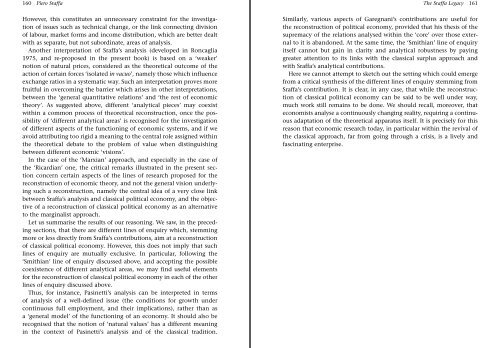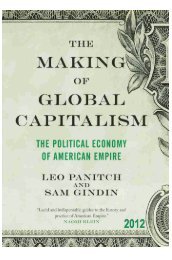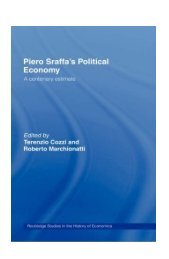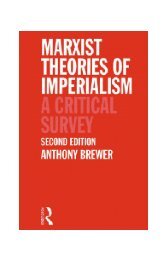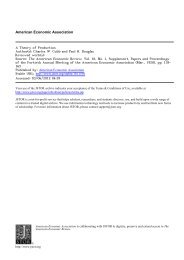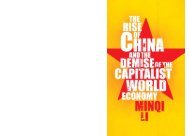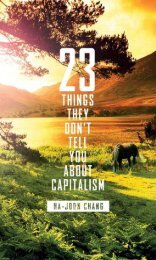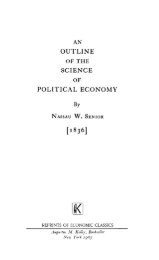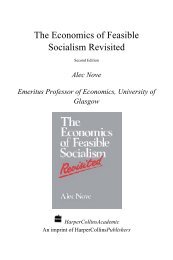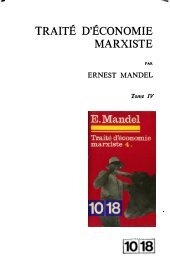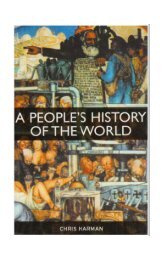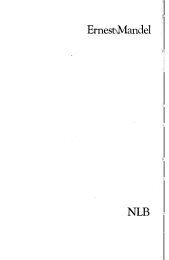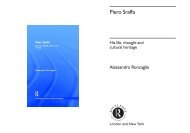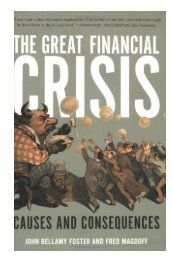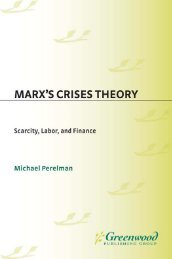160 <strong>Piero</strong> <strong>Sraffa</strong>However, this constitutes an unnecessary constraint for the investigationof issues such as technical change, or the link connecting divisionof labour, market forms and income distribution, which are better dealtwith as separate, but not subordinate, areas of analysis.Another interpretation of <strong>Sraffa</strong>’s analysis (developed in Roncaglia1975, and re-proposed in the present book) is based on a ‘weaker’notion of natural prices, considered as the theoretical outcome of theaction of certain forces ‘isolated in vacuo’, namely those which influenceexchange ratios in a systematic way. Such an interpretation proves morefruitful in overcoming the barrier which arises in other interpretations,between the ‘general quantitative relations’ and ‘the rest of economictheory’. As suggested above, different ‘analytical pieces’ may coexistwithin a common process of theoretical reconstruction, once the possibilityof ‘different analytical areas’ is recognised for the investigationof different aspects of the functioning of economic systems, and if weavoid attributing too rigid a meaning to the central role assigned withinthe theoretical debate to the problem of value when distinguishingbetween different economic ‘visions’.In the case of the ‘Marxian’ approach, and especially in the case ofthe ‘Ricardian’ one, the critical remarks illustrated in the present sectionconcern certain aspects of the lines of research proposed for thereconstruction of economic theory, and not the general vision underlyingsuch a reconstruction, namely the central idea of a very close linkbetween <strong>Sraffa</strong>’s analysis and classical political economy, and the objectiveof a reconstruction of classical political economy as an alternativeto the marginalist approach.Let us summarise the results of our reasoning. We saw, in the precedingsections, that there are different lines of enquiry which, stemmingmore or less directly from <strong>Sraffa</strong>’s contributions, aim at a reconstructionof classical political economy. However, this does not imply that suchlines of enquiry are mutually exclusive. In particular, following the‘Smithian’ line of enquiry discussed above, and accepting the possiblecoexistence of different analytical areas, we may find useful elementsfor the reconstruction of classical political economy in each of the otherlines of enquiry discussed above.Thus, for instance, Pasinetti’s analysis can be interpreted in termsof analysis of a well-defined issue (the conditions for growth undercontinuous full employment, and their implications), rather than asa ‘general model’ of the functioning of an economy. It should also berecognised that the notion of ‘natural values’ has a different meaningin the context of Pasinetti’s analysis and of the classical tradition.The <strong>Sraffa</strong> Legacy 161Similarly, various aspects of Garegnani’s contributions are useful forthe reconstruction of political economy, provided that his thesis of thesupremacy of the relations analysed within the ‘core’ over those externalto it is abandoned. At the same time, the ‘Smithian’ line of enquiryitself cannot but gain in clarity and analytical robustness by payinggreater attention to its links with the classical surplus approach andwith <strong>Sraffa</strong>’s analytical contributions.Here we cannot attempt to sketch out the setting which could emergefrom a critical synthesis of the different lines of enquiry stemming from<strong>Sraffa</strong>’s contribution. It is clear, in any case, that while the reconstructionof classical political economy can be said to be well under way,much work still remains to be done. We should recall, moreover, thateconomists analyse a continuously changing reality, requiring a continuousadaptation of the theoretical apparatus itself. It is precisely for thisreason that economic research today, in particular within the revival ofthe classical approach, far from going through a crisis, is a lively andfascinating enterprise.
References 163References[When more than one edition is quoted, as with translations, page references inthe text refer to the last quoted edition not in parenthesis. When quoting froma non-English text for which no published translation is indicated, the translationis mine.]Abraham-Frois G. and Berrebi E. (1976) Théorie de la valeur, des prix et del’accumulation, Paris: Economica.Adelman M. A. (1972) The World Petroleum Market, Baltimore: Johns HopkinsUniversity Press.Arena R. (1981) ‘A propos de la convergence des prix courants vers les prixnaturels’, Cahiers d’économie politique, 6: 53–75.Babbage C. (1832) On the Economy of Machinery and Manufactures, London.Bailey S. (1825) A Critical Dissertation on the Nature, Measure and Causes of Value.London: R. Hunter; repr. London: Frank Cass 1967.Baldone S. (1974) ‘I1 capitale fisso nello schema teorico di <strong>Piero</strong> <strong>Sraffa</strong>’, Studieconomici, 29: 45–106.Baranzini M. (ed.) (1982) Advances in Economic Theory, Oxford: Blackwell.Becattini G. (1989) ‘Riflessioni sul distretto industriale marshalliano come concettosocio-economico’, Stato e mercato, 25: 111–28.Bellino E. (2008) ‘Book reviews on Production of Commodities by Means ofCommodities’, in Chiodi and Ditta: 23–41.Bellofiore R. (ed.) (1986) Tra teoria economica e grande cultura europea: <strong>Piero</strong> <strong>Sraffa</strong>,Milano: Franco Angeli.—— (2001) ‘Monetary analyses in <strong>Sraffa</strong>’s writings: a comment on Panico’, inCozzi and Marchionatti: 362–76.Bellofiore R. and Potier J.-P. (1998) ‘<strong>Piero</strong> <strong>Sraffa</strong>: nuovi elementi sulla biografia e sullaricezione di Produzione di merci in Italia’, Il pensiero economico italiano, 6: 55–103.Berg M. (2005) Luxury and Pleasure in Eighteenth-Century Britain, Oxford: OxfordUniversity Press.Berle A. A. and Means G. (1932) The Modern Corporation and Private Property,New York: Commerce Clearing House.Bharadwaj K. (1970) ‘On the maximum number of switches between twoproduction systems’, Schweizerische Zeitschrift für Volkswirtschaft und Statistik,106: 409–29; repr. in Bharadwaj 1989: 225–74.—— (1978) Classical Political Economy and Rise to Dominance of Supply and DemandTheories, Calcutta: Orient Longman.—— (1983) ‘On a controversy over Ricardo’s theory of distribution’, CambridgeJournal of Economics 7: 11–36; repr. in Bharadwaj 1989: 77–110.—— (1989) Themes in Value and Distribution, London: Unwin Hyman.Bharadwaj K. and Schefold B. (eds) (1990) Essays on <strong>Piero</strong> <strong>Sraffa</strong>, London: UnwinHyman.Bidard C. (1984) ‘Choix techniques en production jointe’, in C. Bidard (ed.) Laproduction jointe, Paris: Economica.Blackley G. R. and Gossling W. F. (1967) ‘The existence, uniqueness and stabilityof the standard system’, Review of Economic Studies, 34: 427–31.Blaug M. (1974) The Cambridge Revolution, London: IEA.Bliss C. J. (1970) ‘Comment on Garegnani’, Review of Economic Studies, 37: 437–8.Böhm-Bawerk E. von (1889) Kapital und Kapitalzins. Zweite Abteilung: Positive Theoriedes Kapitales, Innsbruck: Verlag der Wagner’schen Universitäts-Buchhandlung.Boggio L. (1985) ‘On the stability of production prices’, Metroeconomica, 37:241–67.—— (1990) ‘The dynamic stability of production prices: a synthetic discussion ofmodels and results’, Political Economy, 6: 47–58.Bortkiewicz L. von (1906–7) ‘Wertrechnung und Preisrechnung im MarxschenSystem’, Archiv für Sozialwissenschaft und Sozialpolitik 23 (1906) n. 1 and 25(1907) nn. 1–2. English transl., ‘Value and price in the Marxian system’,International Economic Papers 1952, 52: 5–60.—— (1907) ‘Zur Berichtigung der grundlegenden theoretischen Konstruktion vonMarx im dritten Band des “Kapital”’, Conrads Jahrbücher für Nationalökonomieund Statistik, series 3, 34: 319–35. English transl., ‘On the correction of Marx’sfundamental theoretical construction in the third volume of Capit al ’, inSweezy (ed.) 1949.Breglia A. (1965) Reddito sociale, ed. by P. Sylos Labini, Roma: Edizioni dell’Ateneo.Burmeister E. (1974) ‘Synthesizing the Neo-Austrian and alternative approachesto capital theory: a survey’, Journal of Economic Literature, 12: 413–56.—— (1977) ‘On the social significance of the reswitching controversy’, Revued’économie politique, 87: 330–50.—— (1979) ‘Professor Pasinetti’s “unobtrusive postulate”, regular economies,and the existence of a well-behaved aggregate production function’, Revued’économie politique, 89: 644–52.Caldwell B. J. (1982) Beyond Positivism: Economic Methodology in the TwentiethCentury, London: Allen & Unwin.Caravale G. (ed.) (1991) Marx and Modern Economic Analysis, 2 vols, Aldershot:Edward Elgar.Caravale G. and Tosato D. (1980) Ricardo and the Theory of Value, Distribution andGrowth, London: Routledge.Casarosa C. (1974) ‘La teoria ricardiana della distribuzione e dello sviluppo economico’,Rivista di politica economica, 44: 959–1015.—— (1978) ‘A new formulation of the Ricardian system’, Oxford Economic Papers,30: 38–63.—— (1982) ‘The new view of the Ricardian theory of distribution and economicgrowth’, in M. Baranzini (ed.) Advances in Economic Theory, Oxford: Blackwell.Chamberlin E. (1933) The Theory of Monopolistic Competition, Cambridge, MA:Harvard University Press.Chiodi G. and Ditta L. (eds) (2008) <strong>Sraffa</strong> or An Alternative Economics, Basingstoke:Palgrave Macmillan.Ciocca P. and Rinaldi R. (1997) ‘L’inflazione in Italia, 1914–20. Considerazioni amargine della tesi di laurea di <strong>Piero</strong> <strong>Sraffa</strong>’, Rivista di storia economica, 13: 3–40.Clapham J. A. (1922) ‘Of empty economic boxes’, Economic Journal, 32: 305–14.Colletti L. (1968) ll marxismo ed Hegel, Bari: Laterza.Corsi M. (1984) ‘Il sistema di fabbrica e la divisione del lavoro: il pensiero diCharles Babbage’, Quaderni di storia dell’economia politica 3: 111–23.162
- Page 1 and 2:
Piero SraffaAlessandro Roncaglia
- Page 3 and 4:
ContentsList of FiguresIntroduction
- Page 5 and 6:
Introduction ixWith this degree of
- Page 7 and 8:
2 Piero Sraffa(1874-1961), professo
- Page 9 and 10:
6 Piero Sraffarevaluation of the li
- Page 11 and 12:
10 Piero Sraffaadministration of th
- Page 13 and 14:
14 Piero Sraffa1.4 Imperfect compet
- Page 15:
18 Piero SraffaIn many fields of ec
- Page 18 and 19:
24 Piero SraffaAn Italian in Cambri
- Page 20 and 21:
28 Piero Sraffanot something fixed,
- Page 22 and 23:
32 Piero Sraffamonetary factors on
- Page 24 and 25:
36 Piero Sraffapartnered in his lab
- Page 26 and 27:
40 Piero SraffaActually, there was
- Page 28 and 29:
44 Piero Sraffadistribution of the
- Page 30 and 31:
48 Piero SraffaLet us recall at thi
- Page 32 and 33:
52 Piero Sraffathe other hand, the
- Page 34 and 35:
56 Piero Sraffaof production. 24 Bu
- Page 36 and 37: 4Basic and Non-Basic Products4.1 Ba
- Page 38 and 39: 64 Piero SraffaA line of argument s
- Page 40 and 41: 68 Piero Sraffathe system stemming
- Page 42 and 43: 72 Piero Sraffaplan that would yiel
- Page 44 and 45: 76 Piero Sraffaproduced less quanti
- Page 46 and 47: 80 Piero Sraffaterms of labour comm
- Page 48 and 49: 84 Piero Sraffaof value is, and mus
- Page 50 and 51: 88 Piero Sraffabeing invariant to c
- Page 52 and 53: 92 Piero Sraffa(variable plus const
- Page 54 and 55: 96 Piero Sraffaconsumption goods),
- Page 56 and 57: 100 Piero Sraffadirectly required f
- Page 58 and 59: 104 Piero Sraffaproduction’ (iden
- Page 60 and 61: 108 Piero SraffaCritique of the Mar
- Page 62 and 63: 112 Piero SraffaThe growing remoten
- Page 64 and 65: 116 Piero Sraffareturns: Sraffa’s
- Page 66 and 67: 120 Piero SraffaFurthermore, the cl
- Page 68 and 69: 124 Piero SraffaIn this way the pro
- Page 70 and 71: 128 Piero SraffaSraffa raised again
- Page 72 and 73: 132 Piero Sraffaconnected, but can
- Page 74 and 75: 136 Piero SraffaThe bridge between
- Page 76 and 77: 140 Piero SraffaSraffa’s work for
- Page 78 and 79: 144 Piero SraffaThis debate is stil
- Page 80 and 81: 148 Piero SraffaObviously the ‘Ma
- Page 82 and 83: 152 Piero SraffaIn comparison to th
- Page 84 and 85: 156 Piero Sraffaof the path actuall
- Page 88 and 89: 164 ReferencesReferences 165——
- Page 90 and 91: 168 ReferencesReferences 169Levhari
- Page 92 and 93: 172 ReferencesReferences 173——
- Page 94 and 95: 176 ReferencesReferences 177——
- Page 96: 180 IndexIndex 181Marx K., 10, 29,


